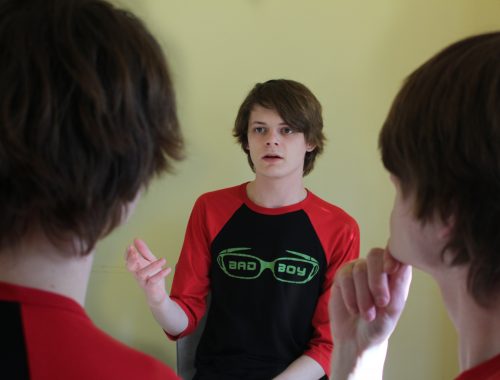
So You Want To Be A Teacher?
“In most cases, the best strategy for a job interview is to be fairly honest, because the worst thing that can happen is that you won’t get the job and will spend the rest of your life foraging for food in the wilderness and seeking shelter underneath a tree or the awning of a bowling alley that has gone out of business.”
― Lemony Snicket, Horseradish
I believe in life there are two types of people; those that don’t like interviews, and those that REALLY don’t like interviews. However, they are a huge part of all of our lives, much to the general public’s disdain. My shock horror upon hearing we will be partaking in simulated interviews should therefore come as no surprise. Prior to this task I would have said I fall firmly in the latter camp, however after 6 months of placement and through the use of the STAR technique, I have gained the skills that have allowed me to ascend to the former camp; a big leap forward I’m sure you’ll agree.
Be A STAR
The star system serves as an ‘Interviewing for Dummies’ guide that really helped me through the process;
Situation
Task
Action
Results
This technique for interviews has made me far more confident in answering questions, as it gave me a platform to base my responses rather than simply saying the first thing that came to mind. It works as a four step guideline to structure responses to questions in an interview environment.
- Situation – The first step is describing contextual information on the experience you are detailing
- Task – This second step builds upon the context and furthers the dialogue to describing the adversity you faced
- Action – You then follow on by detailing what you did to overcome said adversity
- Results – Finally you explain the result of your actions and how it benefited every party involved
Sticking to these steps and not deviating into a nervous introspective tirade was imperative to the outcome of my mock interviews, and was I believe a crucial part of this learning process. This paired with the experience of my placement allowed me to enter a state of confidence that I hadn’t experienced before in this environment.

I will be using Bouds Model Of Reflection (1985) to detail the experience of these mock interviews, as well as to take a look at how they made me feel in the moment and how they will affect my future endeavours.
Experience
I was put into a group of fellow students and tasked with finding a role which they would interview me for. I took to google and found a job listing for a music teacher at Langley Park School for Boys, which fit perfectly in line with my placement of teaching music at college. I decided to focus my preparation in a retrospectively ego-centric manner, favouring my past experiences and expertise over any sense of altruism.
Using the STAR technique I was able to formulate appropriate responses to the line of inquiry, and I detailed my experiences of teaching in my placement, and any hardships I overcame in this capacity. This reliance on a system to base the thesis of my answers helped to steady the initial nerves I felt upon starting the interview; planting my feet when faced with the all too familiar fight or flight reaction.
My self-contained approach to the process, however, landed me in difficulty when I was faced with the question; ‘What do you know about our values as a school?’. A panic took hold of me as I realised I had cast aside any notion of the school’s individualism and instead viewed the occupation as a faceless entity that would simply want to hear about my experiences. A total fumble. I quickly conjured a formulaic response on what any school would value, but immediately knew I had really missed the mark. This threw me out of my groove, and it regrettably lingered in my mind throughout the remainder of the experience.
Reflective Process
Aside from that moment I feel the experience went really well, and I believe my experience of being grilled with constant questions by the students at my placement really prepared me for the grilling of the interviewers. I received favourable feedback from my peers; ‘Interesting content in the answers and gave genuine personal anecdotes to the questions. Answered the questions concisely and gave appropriate examples.’
I feel the nerves I experienced were quickly quelled through the use of the STAR technique, and I would never go into an interviewing situation again without utilising this method. Recovering from the fumble of the question relating to the school’s values was the hardest part of the experience, and is something I have learned a great deal from. In future, I would know to take a deep breath to regain composure, rather than dwelling on the mistake throughout the remainder of the process.
The real learning experience came from realising that whilst the interview is centred around you, as my cover image aptly portrays, the onus is on you to understand their needs as an individual body; rather than viewing all institutions as void of originality. This was clearly illustrated by this point in my feedback; ‘Missed out the importance of good citizenship and to promote the 3 C’s – courtesy, common sense and cooperation – that is listed in the schools strategic objectives’ … ‘Could have given more knowledge about the school.’
Outcomes
I feel my perspective on how to prepare for an interview, as well as how to conduct myself in said interview, has undergone a total shift which I hope has been illustrated throughout this blog post. Previously, without use of the STAR technique, I have been swallowed by nerves and gone on into wild esoteric ramblings and I now feel I am equipped with the tools to formulate a concise and appropriate response.
This paired with newfound respect for due-diligence has made me feel more prepared than ever to enter the market of employability, with a confidence in both myself, and my interview skills; utilising the STAR method to convey work-related terminology in a relevant and engaging way. I am really looking forward to putting this into practice in future endeavours of trying to gain employment in this sector after graduating.
Flashcards…The Key to Success?
Think before you speak
You May Also Like

Shocker, Tom also sucks at interviews!
18 February 2022
9 February 2022

